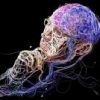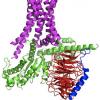I have found that my sleep suffers tremendously whenever I consume less calories than I've burned for the day (this is variable, based on the amount of exercise I've done). I get to bed by 11pm, wake up multiple times during the night, and am typically wide awake at 4am. I can fall in and out of sleep for the next 3 hours, but get out of bed exhausted at 7am, with a need to nap at around noon.
I have nearly perfect sleep hygiene, including infrared lights at night to simulate dusk, a white noise generator, complete darkness, etc. I'm a bit crazy when it comes to my sleep! ;-)
I've experimented by having my heaviest meal at the end of the day, not eating within a couple hours of bedtime, supplementing with melatonin, magnesium & glycine, etc. – but the only thing that seems to work is to eat a very large serving of sugar (honey) or starch (mochi) before bed. However, this is counter to my fitness & longevity goals, and actually makes me want to sleep for more than 8 hours.
Does anybody have other suggestions, or a scientific explanation for my issue? How can I go on a fast or caloric deficit for a day, without it significantly disturbing my sleep? Lifestyle, diet & supplement (but not pharmaceutical) advice would be appreciated. Thanks!





















































